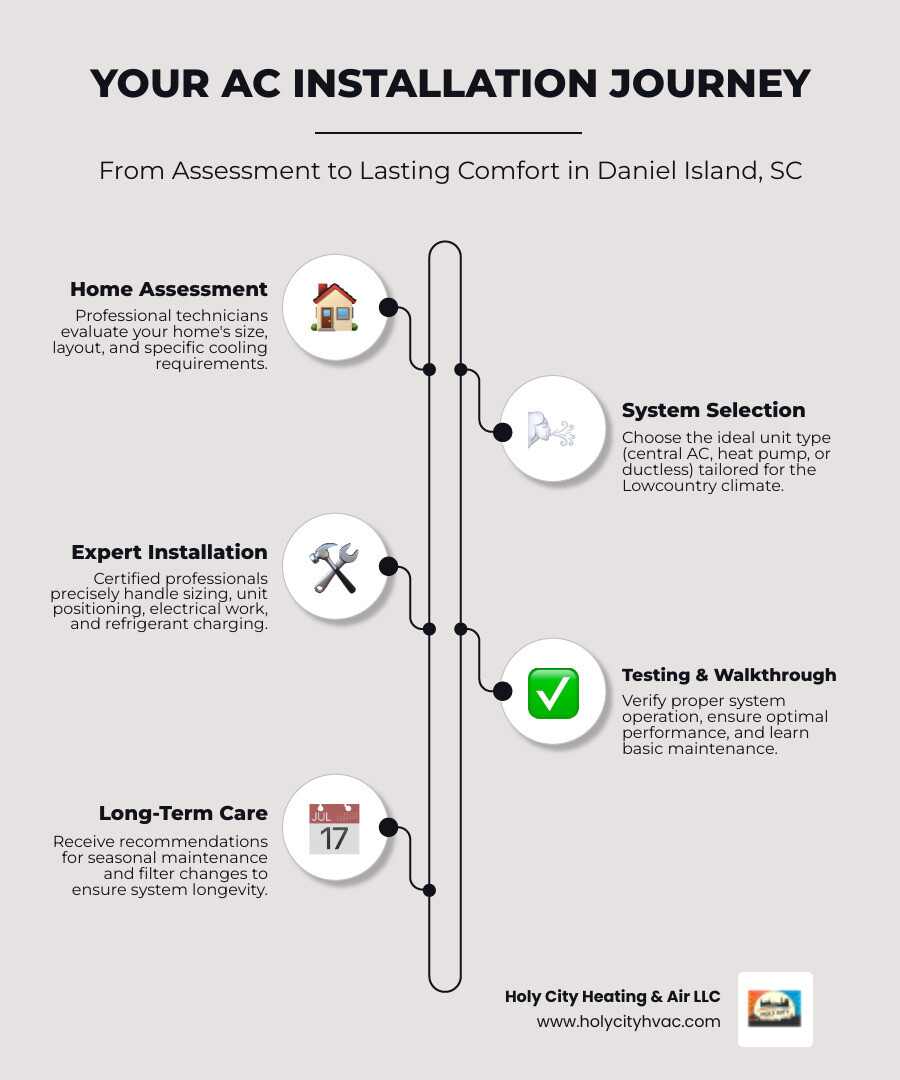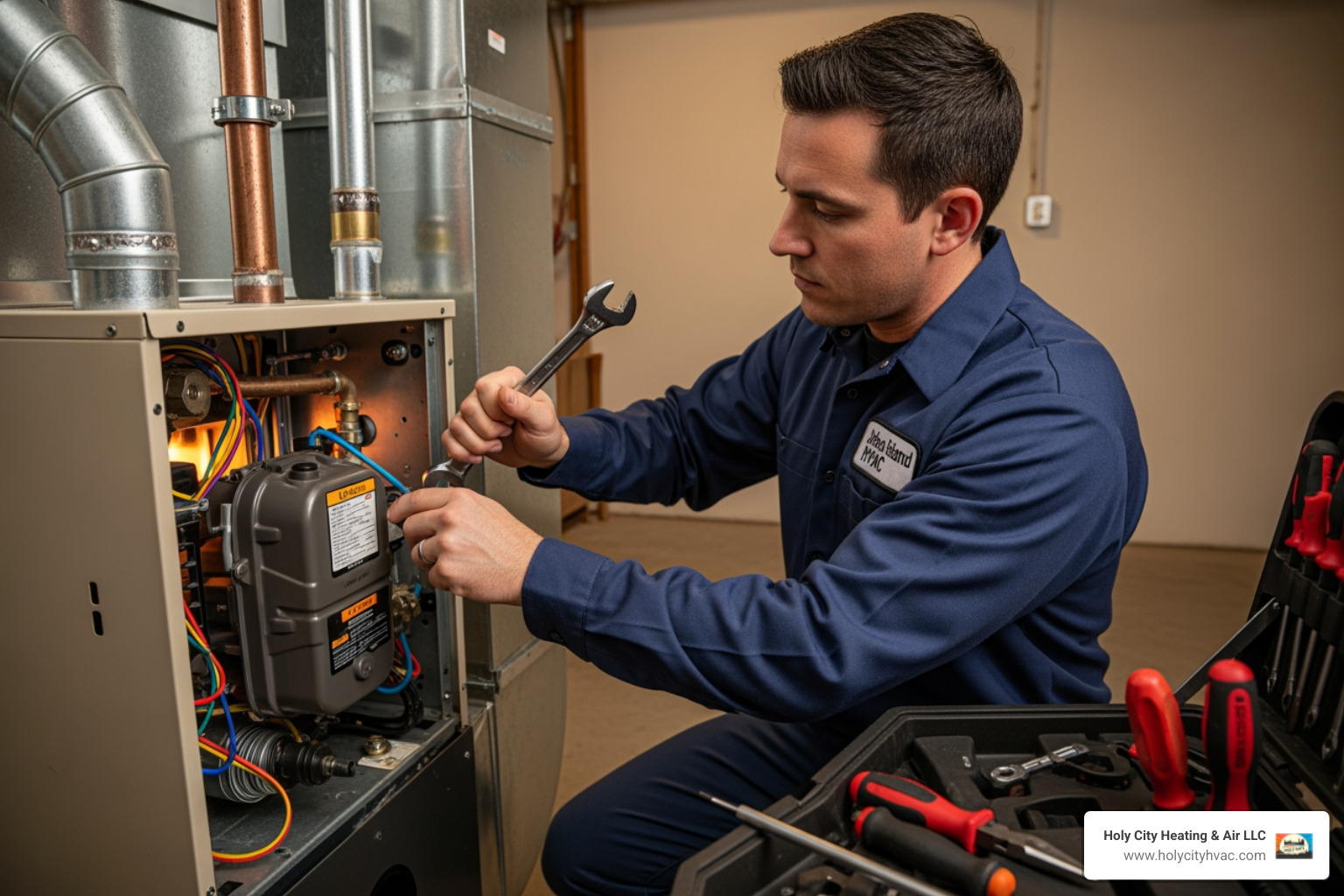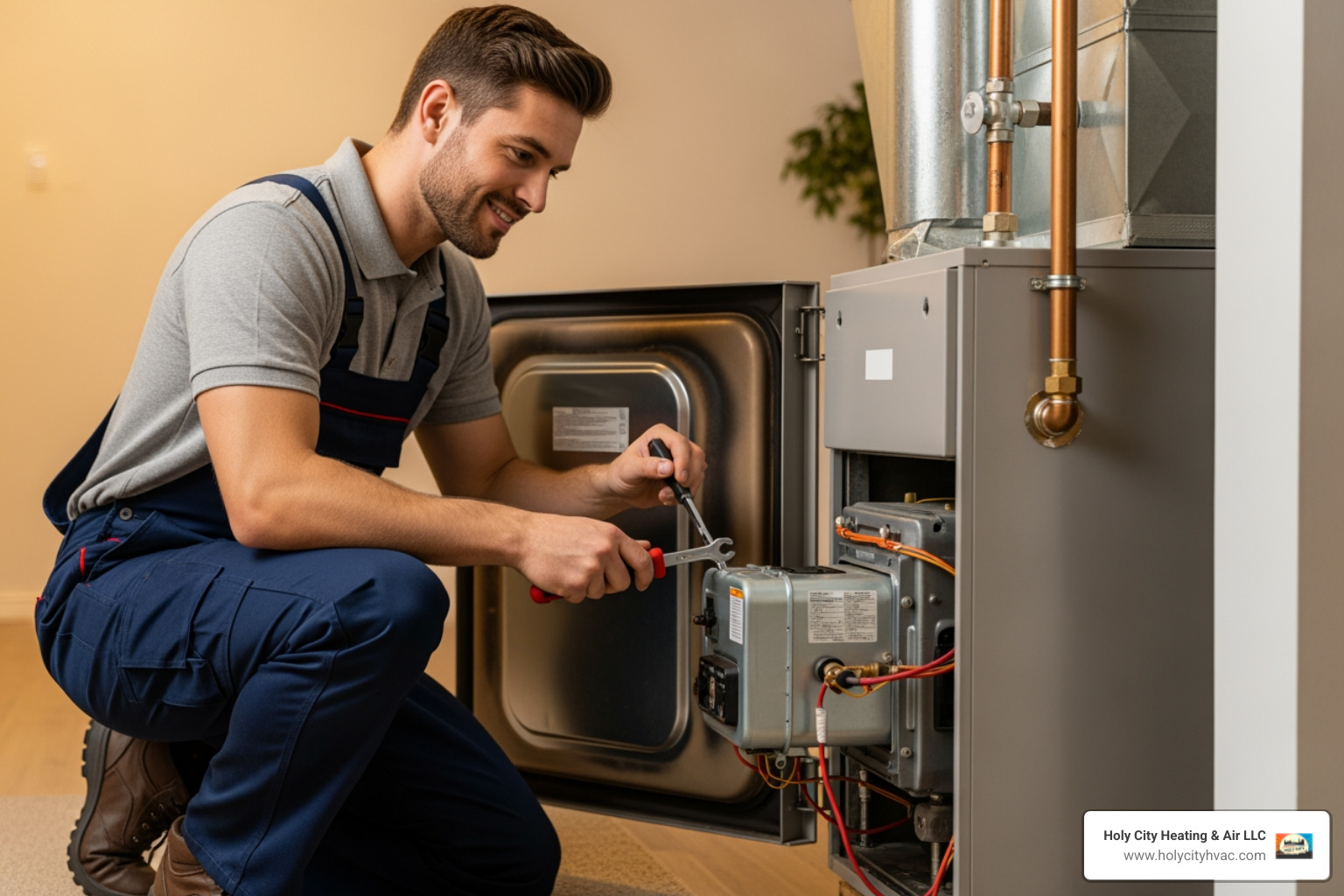
When Your Heater Stops Working: Quick Emergency Response Guide
When you need emergency heater repair, every minute counts - especially during Charleston's coldest nights. A malfunctioning heating system isn't just uncomfortable; it can pose serious safety risks and lead to costly damage like frozen pipes.
Immediate Emergency Response:
- Check for safety hazards - smell gas, carbon monoxide symptoms
- Try simple fixes - thermostat settings, circuit breakers, air filters
- Call a professional - if safety concerns exist or simple checks don't work
- Evacuate immediately - if you smell gas or CO detector sounds
The difference between a regular repair and a true emergency often comes down to safety and temperature. Research shows that heating systems are most likely to fail when temperatures drop, putting extra strain on components. As one HVAC expert notes: "Coming home to a cold house when wintertime sweeps through South Carolina" is exactly when you find if your heating system can handle the demand.
True emergencies include gas leaks, carbon monoxide detection, complete heat loss in freezing weather, or electrical issues like sparks. Standard repairs can wait until normal hours and include things like inefficient heating, minor noises, or routine maintenance needs.
The key is knowing what steps to take immediately to keep your family safe while getting your heat restored quickly. Most emergency situations require professional help, but there are important safety checks and simple troubleshooting steps every homeowner should know.
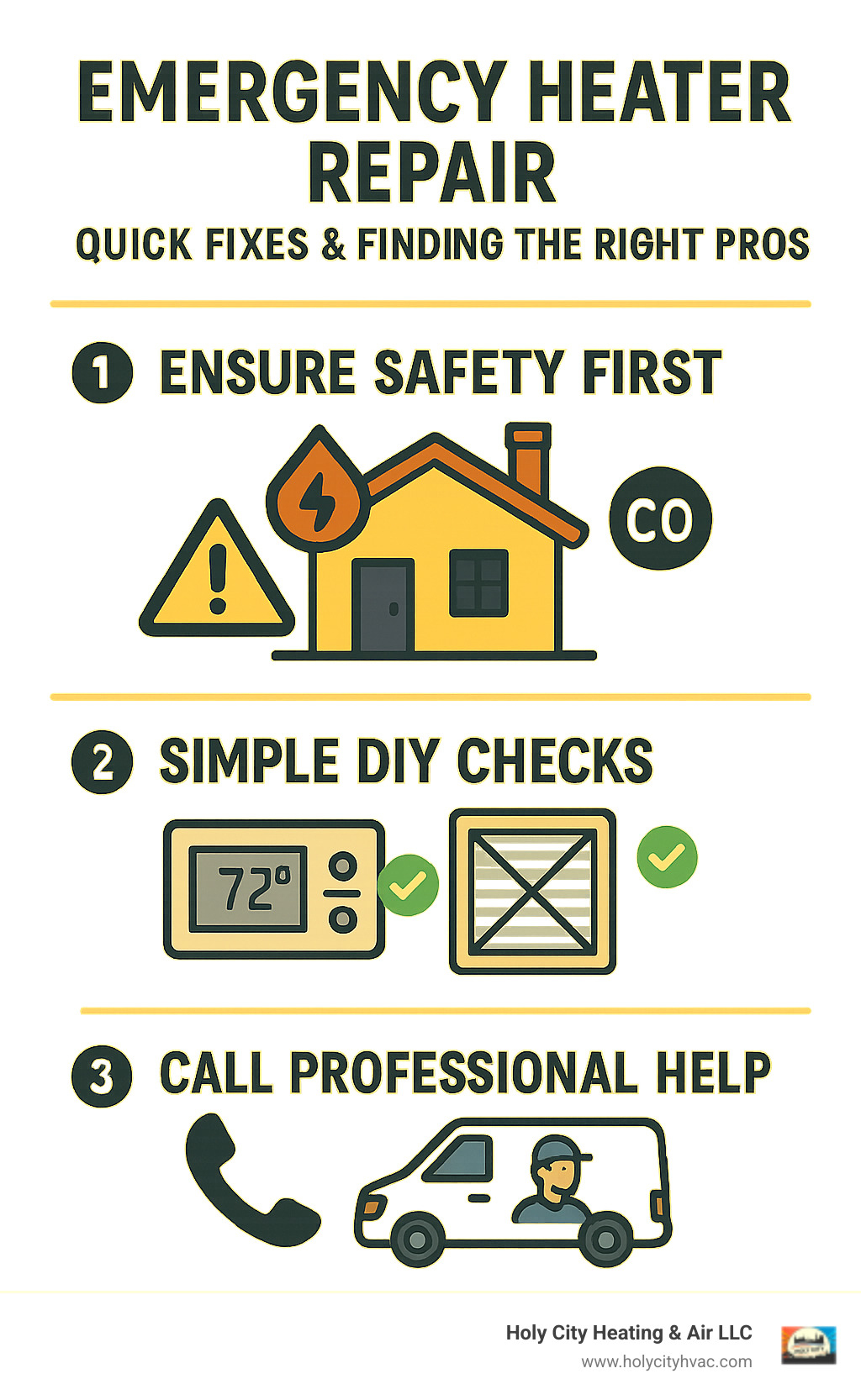
Is It a Real Emergency? Differentiating Urgent from Standard Repairs
Picture this: it's 11 PM on a cold Charleston night, and your heater just made a sound like a dying whale. Your heart skips a beat – do you need to call for help right now, or can this wait until morning?
The truth is, not every heating hiccup requires an emergency heater repair call. While it's natural to worry when your heating system acts up (especially when temperatures drop), understanding the difference between urgent and standard repairs can save you stress, money, and unnecessary late-night panic.
Emergency repairs are needed when there's immediate danger to your safety or property. Think gas leaks, carbon monoxide alarms, or complete heat loss when it's freezing outside. These situations demand action now, not later.
Standard repairs, while still important, can typically wait for a scheduled appointment during regular business hours. These include issues like inefficient heating, minor noises, or routine maintenance needs.
| Emergency Repair Scenarios | Standard Repair Scenarios |
|---|---|
| Gas smell (rotten eggs) | Inefficient heating (higher bills, lukewarm air) |
| Carbon monoxide detector alarm | Minor, intermittent noises (squeaks, hums) |
| Complete loss of heat in freezing temperatures | Frequent cycling (short bursts of heat) |
| Loud, persistent banging, grinding, or screeching noises | Uneven heating (some rooms warm, others cold) |
| Electrical issues (sparks, burning smell, frequent trips) | Increased dust or poor indoor air quality |
| Water pooling around the furnace | Pilot light goes out occasionally (easy to relight) |
The key difference? Emergency situations pose immediate risks to your safety, your family's health, or your home's integrity. Everything else, while inconvenient, can usually wait until the sun comes up.
Critical Signs That Demand an Immediate Call
Some warning signs are like fire alarms for your heating system – when they appear, you need to act fast. Here are the red flags that mean "call for emergency heater repair right now":
Gas smell (rotten eggs) is the big one. Natural gas companies add a chemical that creates that unmistakable "rotten egg" odor so you can detect leaks. If you smell it, don't flip switches, light matches, or play detective. Get everyone out of the house immediately and call your gas company or 911 from a safe distance. This isn't a drill.
Carbon monoxide detector alarm means evacuate now, ask questions later. Carbon monoxide is the silent killer – you can't see, smell, or taste it, but it can be deadly. If your CO detector goes off, it could signal a cracked heat exchanger or other serious furnace problem. Don't ignore it, even if you feel fine. CO poisoning symptoms like headaches, nausea, and fatigue are often mistaken for the flu.
Complete loss of heat in freezing weather might not sound life-threatening, but it can quickly become dangerous. Even in Charleston's relatively mild winters, freezing temperatures can turn your home into an icebox and cause pipes to freeze and burst. Water damage from burst pipes can cost thousands to repair – far more than an emergency service call.
Loud, persistent banging, grinding, or screeching noises are your heater's way of screaming for help. A little operational noise is normal, but sounds like metal grinding on metal or loud banging often signal loose parts, worn bearings, or ignition problems. Ignoring these warning signs can turn a manageable repair into a complete system replacement.
Electrical issues like sparks or burning smells require immediate attention. While a slight burning odor when you first turn on your heat for the season might just be dust burning off, persistent burning smells or visible sparks indicate serious electrical problems that could cause fires. Turn off your system at the breaker and call for help.
Water pooling around the furnace is never normal. Your heating system should manage condensation properly, so standing water usually means something's wrong – possibly a clogged drain, cracked heat exchanger, or internal leak. Left unchecked, water damage can destroy your equipment and create perfect conditions for mold growth.
When in doubt, trust your instincts. If something feels seriously wrong with your heating system, it's always better to err on the side of caution and make that call.
Your First Response: Safety Actions & Simple Troubleshooting
When your heater suddenly stops working, your first instinct might be to immediately call for help. But hold on a minute there are some important safety checks and surprisingly simple fixes you should try first. Think of this as your heating system's "first aid" sometimes a little basic care can get things running again, and more importantly, it keeps everyone safe.
Step 1: Prioritize Safety Above All Else
Before you even think about troubleshooting, we need to talk about safety. Some heating problems aren't just inconvenient they're downright dangerous. If you notice any of these warning signs, forget about DIY fixes and focus on getting everyone to safety.
If you smell gas (that distinctive rotten egg odor), this is not the time to play detective. Get everyone out of the house immediately, including your pets. Don't flip any light switches, use your phone inside, or even start your car if it's parked nearby any little spark could be catastrophic. Once you're safely away from your home, then call your gas company or 911.
When your carbon monoxide detector goes off, treat it like the life-saving alarm it is. Carbon monoxide is invisible and odorless, but it can be deadly. Get everyone outside into fresh air right away and call emergency services. For more information on symptoms and prevention, you can consult the CDC: Carbon Monoxide (CO) Poisoning Prevention and Control. Don't go back inside until professionals give you the all-clear.
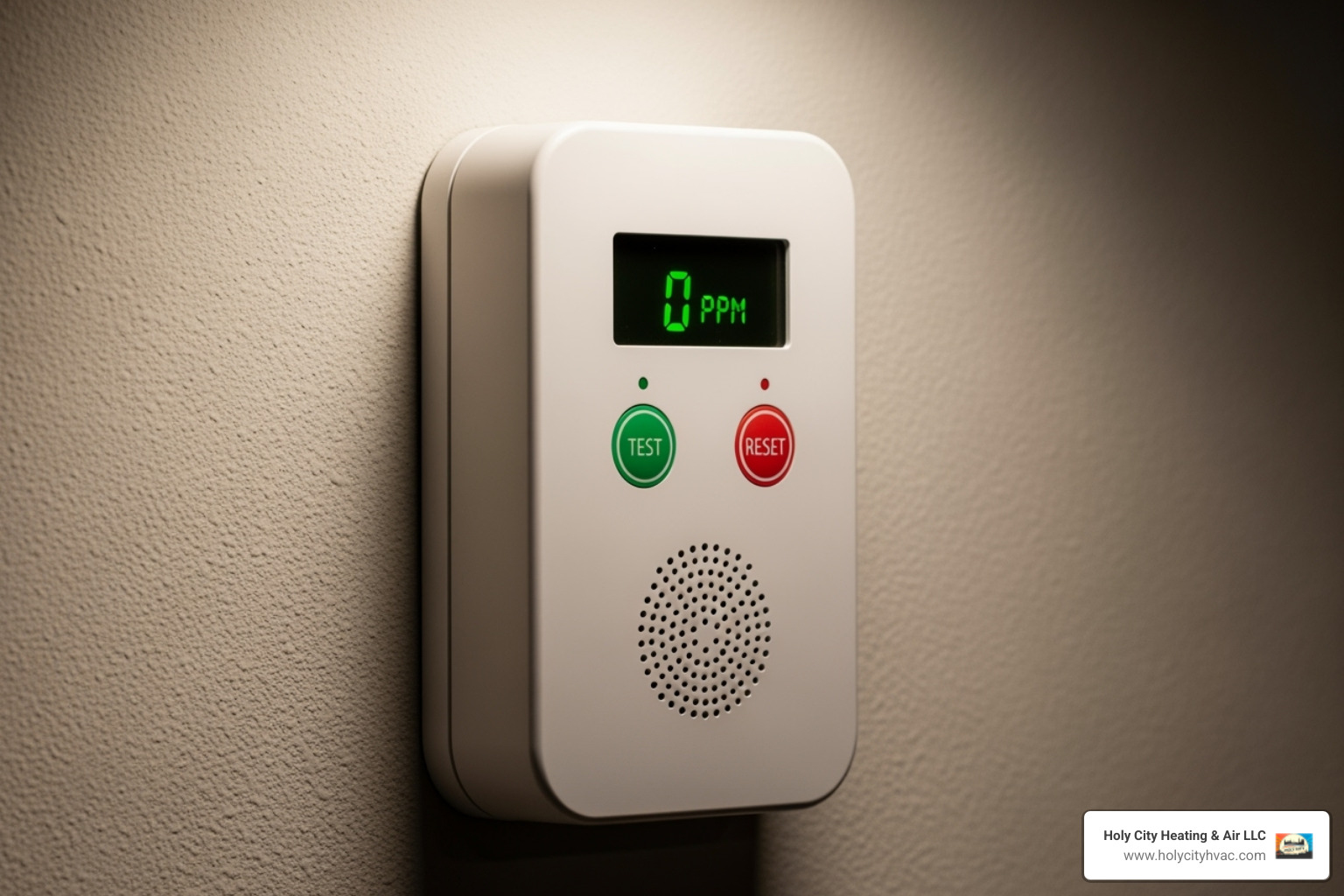
If you see sparks or smell something burning that's electrical (not just dust burning off), turn off your heater at the main breaker immediately. Electrical fires can spread incredibly fast, so this definitely calls for professional emergency heater repair not a DIY approach.
Step 2: DIY Steps Before Calling for an emergency heater repair
Okay, so you've confirmed there are no immediate safety hazards. Now comes the detective work! You'd be amazed how many "broken" heaters just need a little basic attention. Let's walk through the most common culprits.
Start with your thermostat it's the brain of your heating system, and sometimes brains get a little confused. Make sure it's actually set to "Heat" (we've all been there it happens more than you'd think). Check that your target temperature is higher than what the thermostat is currently reading. If your fan is set to "On" instead of "Auto," it might be blowing cold air continuously, making you think the heater isn't working when it's actually just not heating.
Replace those thermostat batteries if it's battery-powered. A dying battery can make your thermostat act like it's having a bad day erratic, unresponsive, or completely shut down.
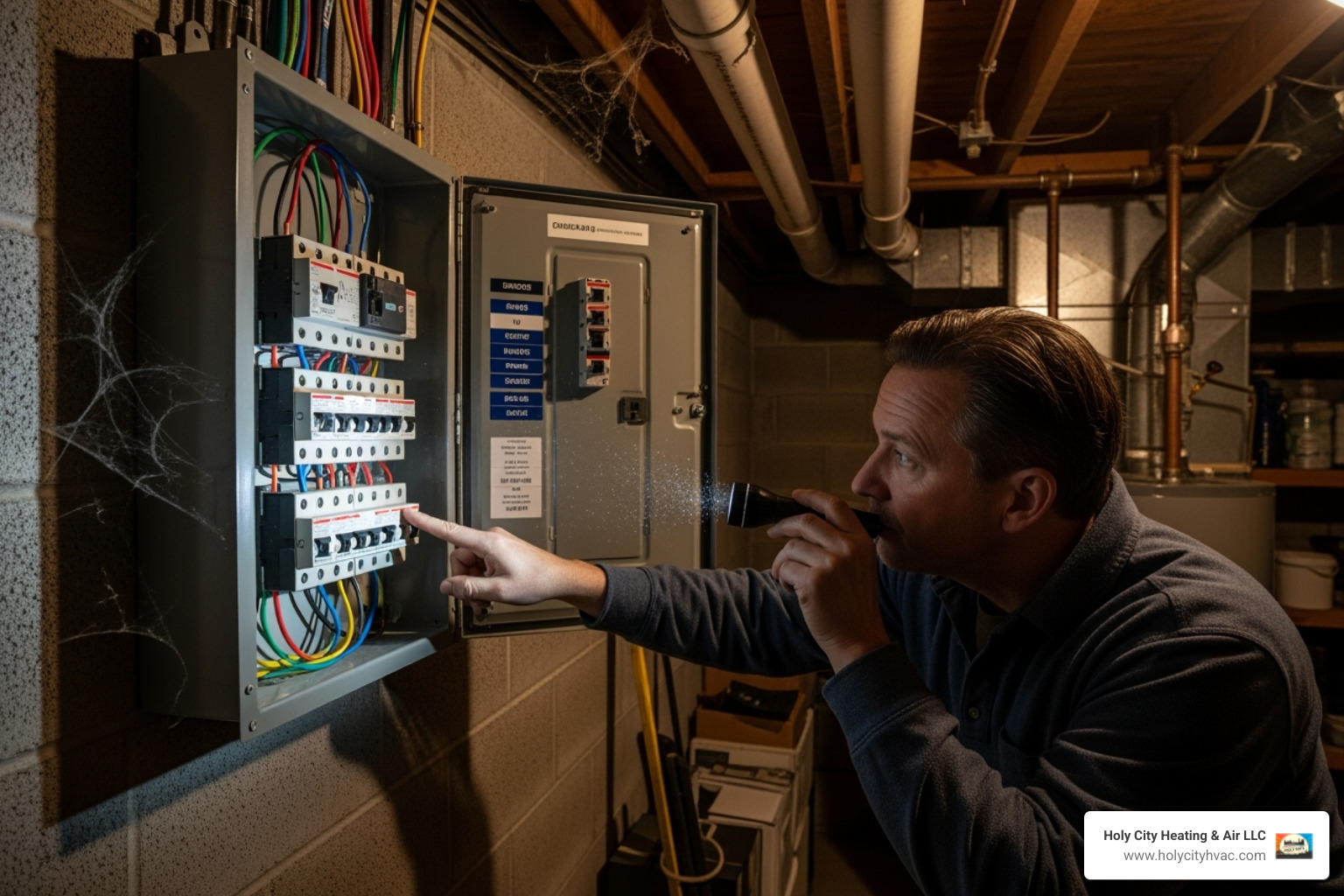
Check your power supply next. For electric heaters, head to your electrical panel and see if a circuit breaker has tripped. If it has, flip it completely off, then back on. But if it trips again immediately, that's a sign of a serious electrical problem time to call the professionals.
Your air filter might be the villain here. A clogged filter is like trying to breathe through a pillow your heater has to work incredibly hard to push air through, and eventually, it just gives up and shuts down to protect itself. Most filters need changing every one to three months, but check yours monthly, especially if you have pets or family members with allergies.
Take a quick walk around your house to make sure all your heating vents are open and clear. It's easy for furniture, curtains, or even that pile of laundry to block a vent. Your heating system needs good airflow to work properly.
For gas furnaces with pilot lights, check if that little blue flame is still burning. If it's out, you can try relighting it following the instructions on your furnace. But if it won't stay lit, or if the flame looks yellow or orange instead of blue, that's a sign something's not right and you'll need professional help.
If you've tried these steps and your heater is still giving you the cold shoulder, or if you noticed any of those serious warning signs we talked about earlier, it's time to call for professional emergency heater repair. Sometimes the best DIY decision is knowing when to call in the experts!
When to Call a Professional for Emergency Heater Repair
You've checked the thermostat, replaced the batteries, and even given your heating system some encouraging words. But sometimes, despite your best DIY efforts, your heater simply won't cooperate. That's when it's time to admit that some problems need the skilled hands of a professional.
Don't feel defeated – recognizing when to call for help is actually a sign of good judgment. Emergency heater repair situations often involve complex mechanical, electrical, or gas-related issues that require specialized tools and expertise to fix safely.
It's definitely time to pick up the phone when your troubleshooting efforts haven't resolved the problem, when your system is making persistent strange noises or producing unusual smells, or when there's no heat at all during cold weather. If you have any safety concerns like suspected gas leaks or electrical issues, don't hesitate – call immediately.
Sometimes your heater might be trying to tell you it's ready for retirement. If your system requires frequent repairs, it might be more cost-effective to consider a replacement rather than another emergency fix.
What to Expect from a Professional Service
When you call Holy City Heating & Air for emergency heater repair, you're getting more than just a quick fix – you're getting peace of mind and a partner who truly cares about your comfort. We understand that heating emergencies don't wait for convenient business hours, which is why we're available 24/7 when you need us most.
Our licensed and insured technicians arrive at your door with years of experience and EPA certification backing their expertise. We're not just qualified – we're locals who understand Charleston's unique climate challenges and the heating systems that work best here.
You won't be waiting around wondering if we have the right parts. Our well-stocked service vehicles carry the components needed for most common repairs, which means we can often get your heat restored the same day. There's nothing worse than being told, "We'll have to come back next week with the part."
When we complete your repair, you can rest easy knowing our work is backed by comprehensive Daikin warranties and the Daikin Comfort Promise. Our NATE-certified experts don't just meet industry standards – they exceed them because we invest in ongoing training for our team.
How Regular Maintenance Prevents Future Emergencies
Here's the thing about emergency heater repair calls – most of them are completely preventable. Think of regular maintenance like going to the doctor for a check-up. It's much better to catch small issues before they become big, expensive problems.
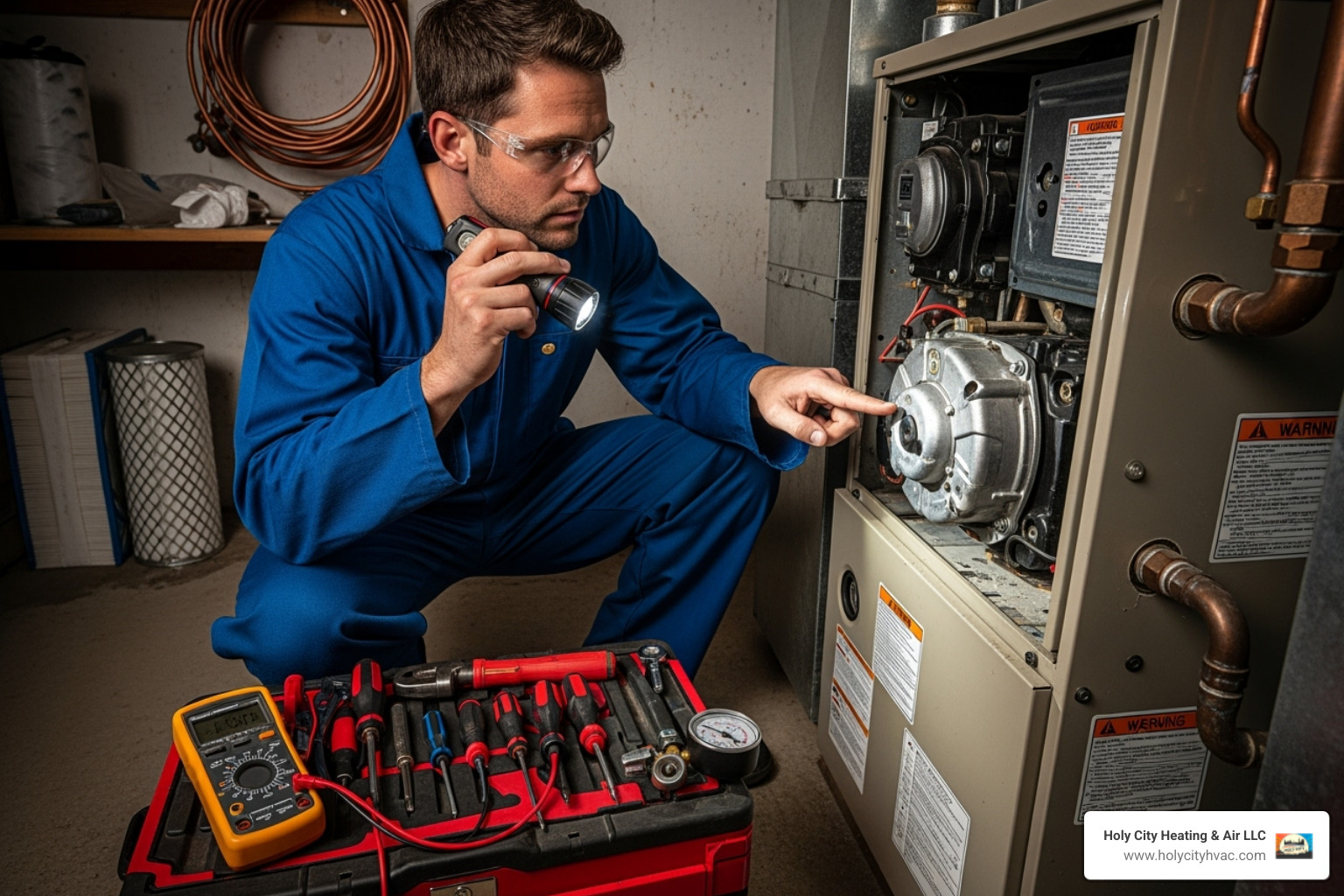
Annual inspections are like having a crystal ball for your heating system. Our technicians can spot worn parts, dirty components, and potential trouble spots before they leave you shivering in the middle of a Charleston cold snap. We're talking about preventing breakdowns entirely, not just fixing them after they happen.
Regular maintenance also extends your equipment's lifespan significantly. A well-maintained heating system can serve your family faithfully for many more years than one that's neglected. It's like the difference between a car that gets regular oil changes and one that doesn't – which one do you think will last longer?
Your wallet will thank you too. A clean, properly tuned heater improves energy efficiency, which means lower utility bills month after month. If you've noticed your energy costs creeping up without explanation, your heating system might be working harder than it needs to.
The consequences of delaying repairs can be serious. What starts as a small issue can snowball into major problems like frozen pipes during cold snaps, leading to water damage that costs thousands to repair. Regular maintenance helps you avoid these expensive headaches entirely.
Frequently Asked Questions about Heater Emergencies
When your heating system decides to take an unscheduled break, especially during Charleston's chillier nights, questions start racing through your mind faster than you can grab another blanket. We've been helping families through these moments since 2015, and we know exactly what you're wondering about. Let's tackle the most common concerns we hear during emergency heater repair calls.
How much does an emergency heater repair typically cost?
We understand that cost is often the first worry when your heater stops working, especially when it happens at the worst possible moment. While every situation is unique and requires a proper diagnosis before we can give you exact numbers, there are some factors that influence what you might expect to pay.
Emergency rates are typically higher than regular service calls because we're dropping everything to help you when you need it most. After-hours, weekend, and holiday calls naturally cost more since our technicians are available around the clock. Think of it like calling an Uber during peak hours - the convenience comes with a premium.
The actual repair cost depends on several key factors. Diagnostic charges cover the time and expertise needed to identify the problem correctly. The parts and labor required vary dramatically depending on whether you need a simple thermostat battery or a major component like a blower motor. The time of day also plays a role - a midnight repair will cost more than one scheduled for Tuesday afternoon.
Sometimes, our technicians might find that your heater has been struggling for a while and needs multiple repairs. In these cases, we'll have an honest conversation about whether continuing repairs makes sense or if replacement would be more cost-effective in the long run. Our goal is always to give you the most value for your investment.
Can a repair wait until morning if my heater breaks at night?
This is probably the question we get most often during late-night calls, and honestly, it's a great question to ask. The answer depends on a few critical factors that go beyond just your comfort level.
Safety always comes first. If you're dealing with any of the emergency signs we mentioned earlier - gas smells, carbon monoxide alarms, electrical sparks, or strange burning odors - the repair absolutely cannot wait. These situations require immediate professional attention, no matter what time it is.
For heating failures without immediate safety concerns, consider the outdoor temperature and who's in your home. When Charleston temperatures drop to freezing or below, waiting until morning becomes risky. Your home can get dangerously cold, and you face the real threat of frozen pipes, which can burst and cause thousands of dollars in water damage.
Vulnerable household members change the equation significantly. Elderly family members, infants, and anyone with health conditions are more susceptible to cold temperatures. What might be an uncomfortable night for a healthy adult could be dangerous for them.
Even from a practical standpoint, delaying repairs can lead to more damage. A struggling heating system often works harder to compensate for problems, potentially causing additional components to fail. What starts as a simple fix can become a much more expensive repair if left overnight.
When in doubt, give us a call. We can often help you assess the risk over the phone and determine if the situation can safely wait or needs immediate attention.
What are the most common causes of a sudden heater failure?
After nearly a decade of emergency heater repair calls throughout Charleston, we've seen it all. While every situation is unique, certain culprits show up again and again, often catching homeowners completely off guard.
Faulty ignitors and dirty flame sensors top our list for gas furnaces. These components are like the spark plugs of your heating system - when they're dirty or worn out, your furnace simply won't light. The good news is that these are relatively common repairs that our technicians handle regularly.
Clogged air filters cause more sudden breakdowns than most people realize. When a filter gets severely dirty, it restricts airflow so much that your system overheats and shuts down as a safety measure. It's amazing how something so simple can bring an entire heating system to its knees.
Blower motor failure creates a particularly frustrating situation. Your furnace might be firing perfectly, but without the blower motor to circulate the heated air, you won't feel any warmth coming from your vents. You might hear unusual grinding or squealing noises before it fails completely.
Thermostat malfunctions can be deceptively simple or surprisingly complex. Sometimes it's just dead batteries, but other times it's internal wiring issues or programming problems that prevent your heater from getting the right signals. Modern programmable thermostats are wonderful until they're not.
For older gas furnaces, pilot light issues remain a common problem. If your pilot light keeps going out, it could indicate problems with the gas supply, a dirty thermocouple, or even drafts affecting the flame. While you might be able to relight it once, recurring pilot light problems need professional attention.
Electrical problems often announce themselves with frequent circuit breaker trips. Your heating system draws significant power, and when there's a short circuit or overloaded circuit, those breakers do their job by shutting things down. These issues require immediate professional diagnosis since they can pose fire hazards.
The silver lining in all of this is that most of these problems are preventable with regular maintenance. Our annual tune-ups catch many of these issues before they leave you in the cold, literally and figuratively.
Conclusion
When your heater decides to call it quits on the coldest night of the year, it doesn't have to turn into a disaster. The key is staying calm and following the right steps: prioritize safety first, try those simple troubleshooting checks we covered, and don't hesitate to call for professional emergency heater repair when you're dealing with anything beyond basic fixes.
Think of it this way - you wouldn't ignore chest pains and hope they go away, so don't ignore warning signs from your heating system. Whether it's that unmistakable rotten egg smell, strange banging noises, or complete heat loss during a cold snap, these situations need immediate attention from trained professionals.
For over 20 years, our family-owned Holy City Heating & Air LLC has been the go-to choice for Charleston families when their heating systems need help. Since 2015, we've been proudly serving not just Charleston, but all the surrounding communities - from the beaches of Kiawah Island and Folly Beach to the growing neighborhoods of Summerville and Mt Pleasant, and everywhere in between including Johns Island, Daniel Island, Edisto Island, Goose Creek, Hollywood, Isle of Palms, James Island, Ravenel, Seabrook, Sullivan's Island, Wadmalaw, and West Ashley.
What sets us apart is simple: we combine the reliability and resources you'd expect from an established company with the personal touch that only comes from being truly local. Our EPA-certified professionals aren't just technically skilled - they understand Charleston's unique climate challenges and have the experience to diagnose problems quickly and accurately. Plus, with our comprehensive Daikin warranties and the Daikin Comfort Promise backing our work, you can rest easy knowing your investment is protected.
We believe in doing things right the first time, which is why we invest heavily in training our team and keeping our service vehicles fully stocked with quality parts. When you call us for an emergency, we're not just fixing your heater - we're restoring your peace of mind.
Your comfort and safety are too important to leave to chance. When heating emergencies strike, you need a partner you can trust to respond quickly, work efficiently, and stand behind their service.
Recent posts






